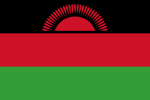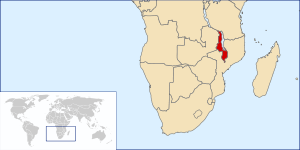Portal:Malawi
Malawi (/məˈlɑːwi/; lit. 'flames' in Chichewa and Chitumbuka), officially the Republic of Malawi and formerly known as Nyasaland, is a landlocked country in Southeastern Africa. It is bordered by Zambia to the west, Tanzania to the north and northeast, and Mozambique to the east, south, and southwest. Malawi spans over 118,484 km2 (45,747 sq mi) and has an estimated population of 21,240,689 (as of 2024). Malawi's capital and largest city is Lilongwe. Its second-largest is Blantyre, its third-largest is Mzuzu, and its fourth-largest is Zomba, the former capital. The part of Africa now known as Malawi was settled around the 10th century by migrating Bantu groups. They formed the Maravi kingdom which flourished from the 16th century. In 1891, the area was colonised by the British as the British Central African Protectorate, and it was renamed Nyasaland in 1907. In 1964, the protectorate was ended: Nyasaland became an independent country as a Commonwealth realm under Prime Minister Hastings Banda, and was renamed Malawi. Two years later, Banda became president by converting the country into a one-party presidential republic. Banda was declared President for life in 1971, and Malawi's next few decades of independence were characterized by Banda's highly repressive dictatorship. Following the introduction of a multiparty system in 1993, Banda lost the 1994 general election. Today, Malawi has a democratic, multi-party republic headed by an elected president. According to the 2024 V-Dem Democracy indices, Malawi is ranked 74th electoral democracy worldwide and 11th electoral democracy in Africa. The country maintains positive diplomatic relations with most countries, and participates in several international organisations, including the United Nations, the Commonwealth of Nations, the Southern African Development Community (SADC), the Common Market for Eastern and Southern Africa (COMESA), and the African Union (AU). Malawi is one of the world's least-developed countries. The economy is heavily based on agriculture, and it has a largely rural and growing population. The Malawian government depends heavily on outside aid to meet its development needs, although the amount needed (and the aid offered) has decreased since 2000. Key indicators of progress in the economy, education, and healthcare were seen in 2007 and 2008. Malawi has a low life expectancy and high infant mortality. HIV/AIDS is highly prevalent, which both reduces the labour force and requires increased government expenditures. The country has a diverse population that includes native peoples, Asians, and Europeans. Several languages are spoken, and there is an array of religious beliefs. Although in the past there was a periodic regional conflict fuelled in part by ethnic divisions, by 2008 this internal conflict had considerably diminished, and the idea of identifying with one's Malawian nationality had reemerged. (Full article...)  Tea and fish are popular features of Malawian cuisine. Sugar, coffee, corn, potatoes, sorghum, cattle and goats are also important components of the cuisine and economy. Lake Malawi is a source of fish including chambo (similar to bream), usipa (similar to sardine), mpasa (similar to salmon), and kampango. (Full article...)
The following are images from various Malawi-related articles on Wikipedia.
Wikinews Malawi portal
 Credit: Steve Evans
A child stands before sunrise on the shore of Lake Malawi, Africa's third largest freshwater lake. The following Wikimedia Foundation sister projects provide more on this subject:
Discover Wikipedia using portals | ||||


















![Image 15Locations of Malawian diplomatic embassies or high commissions as of 2012[update] (from Malawi)](http://upload.wikimedia.org/wikipedia/commons/thumb/2/27/Diplomatic_missions_of_Malawi.png/180px-Diplomatic_missions_of_Malawi.png)





























